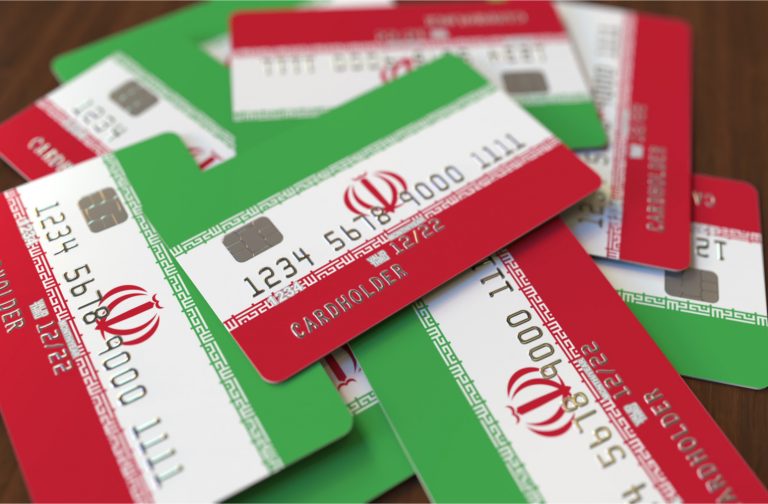
The private details of 15 million bank debit cards in Iran have been published on Telegram in the largest banking security incident in the country’s history. Iranian authorities so far try to blame the breach on common criminals but cyber security experts suspect it was the work of intelligence agencies from the U.S. or Israel.
Also Read: Global Crypto War Is Heating up – Iran Next in Line With Its Own Gold-Backed Coin
Millions of Iranians’ Cards Exposed on Telegram
As if people needed another reason to get away from the insecure current financial system, it appears that banks may now be on the front lines of a global conflict waged with cyber warfare where personal accounts are a legitimate target.
The details of 15 million debit cards in Iran have been exposed online in the largest financial security breach in the history of the country, according to local media reports. The exposed accounts belong to clients of the three largest Iranian banks, Mellat, Tejarat and Sarmayeh, and they represent almost 20% of the country’s entire population. “This is the largest financial scam in Iran’s history,” reported Aftab News. “Millions of Iranians are worried to find their names among the list of hacked accounts.”
On Sunday Iran’s information and telecommunications minister, Mohammad Javad Azari Jahromi, claimed that the banks’ systems were not hacked and that the personal data was simply stolen by a disgruntled contractor with access to the accounts, for extortion purposes. However, cyber security experts suspect it was the work of intelligence agencies from the U.S. or Israel according to a report in the New York Times.

The Iranian debit cards started to be exposed online on November 27, with private information posted on a Telegram channel named “Your banking cards” according to the reports. The data on the Telegram channel included the names of account holders as well as their account numbers. The attackers also added instructions on how anyone could use the information to make fake cards for themselves.
The Telegram channel offered contradictory explanations for the real intent of the hack. On the one hand the attackers claimed that they demanded money from the banks to prevent them from publishing the card details but have been ignored. On the other hand they wrote “we will burn the reputation of their banks the same way we torched their banks,” trying to link themselves to the Iranian people who reportedly burned over 700 banks across the country in recent protests.
Banks Now Legitimate Target in Global Cyber Warfare?
A growing list of governments is reportedly engaged in some form of cyber warfare in recent years including Iran, Russia, China, North Korea, the U.S. and Israel. Attacks by state intelligence agencies have been carried out against civilian targets such as nuclear plants and electric infrastructure as well as the financial system. The U.S. for example accuses Iran of major cyber attacks against American targets including Bank of America, JP-Morgan Chase, Wells Fargo, US Bank and PNC Bank.
Assuming that the latest attack on banks in Iran came from the country’s foreign adversaries, the goal seems to be to create financial panic among the populace that is already losing trust in the government’s ability to stabilize the economy. However, the civilians of Iran’s rival nations could also soon learn how exposed they are too, if the country decides to retaliate against their banks again.
Clear Sky, a cyber security company that helps protect many major Israeli financial institutions, issued a warning last week to credit card companies in Israel to be on alert for a possible Iranian retaliation. Boaz Dolev, the chief executive officer of Clear Sky, told the New York Times that the large scale of the cyber attack in Iran suggested that those behind it have a “high technological capability, which is usually at the hand of state intelligence services.”

If the Iranian debit cards hack was indeed part of a larger cyber warfare campaign it doesn’t seem to be letting up. On Wednesday Minister Mohammad Javad Azari Jahromi announced that a massive cyber attack against Iran’s electronic government systems had been thwarted.
“Recently, a highly organized and state-sponsored cyberattack was carried out against our e-government infrastructures, which was successfully identified and repelled by the country’s cyber security shield,” the minister told Iranian reporters on the sidelines of a cabinet meeting. “The attack was really massive. I can’t disclose any details right now, but all aspects of the attack have been already discussed and there will be certainly a report on it later. I can’t say the attack was carried out by which country right now,” he added.
What do you think about the possibility that the U.S. or Israel attacked Iranian banks and exposed the private details of 15 million debit cards? Share your thoughts in the comments section below.
Images courtesy of Shutterstock.
Verify and track bitcoin cash transactions on our BCH Block Explorer, the best of its kind anywhere in the world. Also, keep up with your holdings, BCH and other coins, on our market charts at Bitcoin.com Markets, another original and free service from Bitcoin.com.
The post 15 Million Debit Cards Exposed as Iranian Banks Fall Victim to Cyber Warfare appeared first on Bitcoin News.
via Avi Mizrahi

0 comments:
Post a Comment